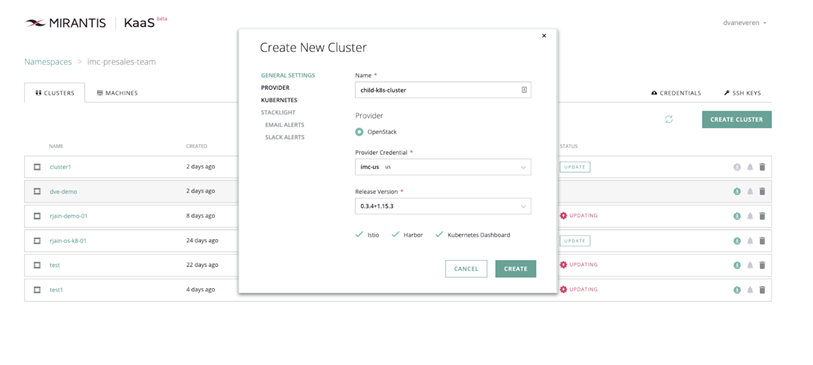Mirantis Launches Managed Kubernetes Service
Mirantis today announced it has made available in beta a managed distributed Kubernetes service based on a global network of data centers and cloud services.
Announced at the KubeCon + CloudNativeCon 2019 conference, the Kubernetes-as-a-Service platform from Mirantis will allow developers to create Kubernetes clusters on demand via either an application programming interface (API) or a graphical user interface that Mirantis has built for the service.
 Company CEO Adrian Ionel says the goal is to allow organizations to focus more of their limited resources building applications versus operating the platforms on which those applications are deployed. As organizations automate the lifecycle management of Kubernetes clusters, there should be a corresponding increase in the number of containerized applications that organizations will be able to deploy faster, he says.
Company CEO Adrian Ionel says the goal is to allow organizations to focus more of their limited resources building applications versus operating the platforms on which those applications are deployed. As organizations automate the lifecycle management of Kubernetes clusters, there should be a corresponding increase in the number of containerized applications that organizations will be able to deploy faster, he says.
The Mirantis Kubernetes service also will make it easier for organizations to move applications between Kubernetes clusters, which Ionel says means organizations no longer need to be concerned about becoming locked into a single cloud service provider. In fact, he adds, organizations should find themselves in a better position to play one cloud service provider against another.
Just as significantly, organizations also will be able to deploy an identical fleet of Kubernetes clusters consistently and securely versus having to manage isolated instances of Kubernetes that are all configured differently, Ionel says. Each organization also will retain control over when to upgrade its Kubernetes clusters regardless of whether they are deployed in a public cloud, a private cloud or on a bare-metal server on the network edge.
Ionel says the technologies and resources Mirantis gained by acquiring the enterprise business of Docker Inc. eventually will be applied to this service, but the company had been planning to make this service available long before it decided to make the acquisition.
In effect, Mirantis plans to become the IT operations team for developers building containerized applications. The challenge most organizations have today is there are not that many IT professionals that have the skills required to deploy Kubernetes at scale, yet developers are building and deploying containerized applications at a faster rate. It’s not clear to what degree organizations will be willing to essentially outsource the management of Kubernetes clusters to a service provider. However, Ionel notes there is now little difference between relying on a managed service provider (MSP) and a cloud service provider that most organizations have already embraced.
Of course, the biggest challenge will be cultural: Most organizations are going to have to align their processes with those of the MSP they employ to manage their Kubernetes clusters.
Obviously, Mirantis is not the only MSP planning to make available a Kubernetes-based service. But this offering is clearly one of the most ambitious to date. The challenge now will be convincing organizations that an MSP such as Mirantis is a lot more qualified to manage Kubernetes at scale than any internal IT team could ever hope to be.




